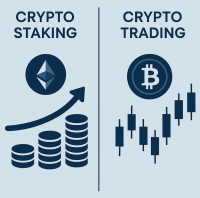This article will analyze the pros and cons of trading stocks versus cryptocurrencies to determine which is the better investment for different types of traders.
Stocks Trading
Stocks represent shares of ownership in publicly traded companies. Investors can buy and sell stocks through stock exchanges such as the New York Stock Exchange (NYSE) and NASDAQ.
Pros of Stock Trading:
- Regulation and Stability: Stocks are heavily regulated by financial authorities, such as the SEC (Securities and Exchange Commission), providing a safer trading environment.
- Long-Term Growth: Stocks historically offer steady growth over time, making them a reliable investment for wealth accumulation.
- Dividend Payments: Many companies offer dividends, providing a passive income stream to investors.
- Lower Volatility: Compared to cryptocurrencies, stocks experience less volatility, making them suitable for conservative investors.
- Availability of Fundamental Analysis: Traders can analyze financial statements, earnings reports, and economic indicators to make informed decisions.
Cons of Stock Trading:
- Limited Market Hours: Stock markets operate within fixed hours, limiting trading opportunities.
- Lower Short-Term Gains: Stocks typically do not offer the same high short-term gains as cryptocurrencies.
- Higher Entry Barriers: Some stocks have high share prices, requiring substantial capital for investment.
Risks in Stock Trading:
- Market Fluctuations: Economic downturns and company-specific issues can negatively impact stock prices.
- Company Performance: Poor management or financial struggles can lead to losses.
- Interest Rate and Inflation Risks: Changes in interest rates and inflation can influence stock performance.
Cryptocurrency Trading
Cryptocurrencies are digital assets based on blockchain technology. Unlike stocks, they are decentralized and operate on a 24/7 market.
Pros of Crypto Trading:
- High Potential Returns: Crypto markets experience significant price swings, offering opportunities for quick gains.
- 24/7 Market: Unlike stocks, cryptocurrencies can be traded anytime, providing flexibility.
- Decentralization: Cryptocurrencies are not controlled by governments or central banks, offering autonomy.
- Low Barriers to Entry: Investors can buy fractional cryptocurrencies with minimal capital.
- Innovative Technology: Blockchain and DeFi (Decentralized Finance) projects present new investment opportunities.
Cons of Crypto Trading:
- High Volatility: Cryptos can experience extreme price fluctuations, leading to potential losses.
- Regulatory Uncertainty: Governments worldwide have varying stances on crypto regulation, impacting market stability.
- Security Risks: Hacks, scams, and lost private keys pose risks to investors.
- Lack of Fundamental Analysis: Unlike stocks, cryptocurrencies do not have earnings reports or traditional financial metrics for evaluation.
Risks in Crypto Trading:
- Market Manipulation: The lack of regulation makes crypto markets susceptible to price manipulation.
- Cybersecurity Threats: Investors face risks from hacking and fraud.
- Lack of Consumer Protection: Unlike stock markets, crypto investors do not have the same legal protections.
Which Is Better for Beginners and Experienced Traders?
For beginners, stock trading is generally the safer option due to its stability, regulation, and accessibility to fundamental analysis. It is ideal for long-term wealth-building and risk-averse investors. Cryptocurrencies, while offering high returns, are riskier and require extensive market knowledge.
For experienced traders, cryptocurrencies may present lucrative opportunities due to their volatility and potential for rapid gains. However, they should only invest what they can afford to lose and implement strict risk management strategies.
Final Verdict
Both stocks and cryptocurrencies have their merits and drawbacks. Beginners may find stock trading more suitable for steady growth, while experienced traders can explore crypto markets for high-reward opportunities. The best investment depends on individual risk tolerance, financial goals, and trading expertise.








